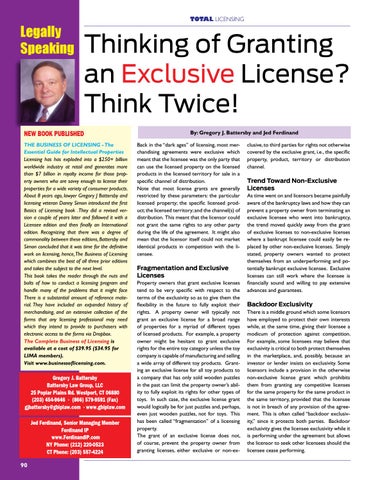Legally Speaking
TOTAL LICENSING
Thinking of Granting an Exclusive License? Think Twice!
NEW BOOK PUBLISHED THE BUSINESS OF LICENSING - The Essential Guide for Intellectual Properties Licensing has has exploded into a $250+ billion worldwide industry at retail and generates more than $7 billion in royalty income for those property owners who are savvy enough to license their properties for a wide variety of consumer products. About 8 years ago, lawyer Gregory J Battersby and licensing veteran Danny Simon introduced the first Basics of Licensing book .They did a revised version a couple of years later and followed it with a Licensee edition and then finally an International edition. Recognizing that there was a degree of commonality between these editions, Battersby and Simon concluded that it was time for the definitive work on licensing, hence, The Business of Licensing which combines the best of all three prior editions and takes the subject to the next level. This book takes the reader through the nuts and bolts of how to conduct a licensing program and handle many of the problems that it might face There is a substantial amount of reference material. They have included an expanded history of merchandising, and an extensive collection of the forms that any licensing professional may need which they intend to provide to purchasers with electronic access to the forms via Dropbox. The Complete Business of Licensing is available at a cost of $39.95 ($34.95 for LIMA members). Visit www.businessoflicensing.com.
Gregory J. Battersby Battersby Law Group, LLC 25 Poplar Plains Rd. Westport, CT 06880 (203) 454-9646 • (866) 579-9591 (Fax) gjbattersby@gbiplaw.com • www.gbiplaw.com Jed Ferdinand, Senior Managing Member Ferdinand IP www.FerdinandIP.com NY Phone: (212) 220-0523 CT Phone: (203) 557-4224 90
By: Gregory J. Battersby and Jed Ferdinand Back in the “dark ages” of licensing, most merchandising agreements were exclusive which meant that the licensee was the only party that can use the licensed property on the licensed products in the licensed territory for sale in a specific channel of distribution. Note that most license grants are generally restricted by these parameters: the particular licensed property; the specific licensed product; the licensed territory; and the channel(s) of distribution. This meant that the licensor could not grant the same rights to any other party during the life of the agreement. It might also mean that the licensor itself could not market identical products in competition with the licensee.
Fragmentation and Exclusive Licenses Property owners that grant exclusive licenses tend to be very specific with respect to the terms of the exclusivity so as to give them the flexibility in the future to fully exploit their rights. A property owner will typically not grant an exclusive license for a broad range of properties for a myriad of different types of licensed products. For example, a property owner might be hesitant to grant exclusive rights for the entire toy category unless the toy company is capable of manufacturing and selling a wide array of different toy products. Granting an exclusive license for all toy products to a company that has only sold wooden puzzles in the past can limit the property owner’s ability to fully exploit its rights for other types of toys. In such case, the exclusive license grant would logically be for just puzzles and, perhaps, even just wooden puzzles, not for toys. This has been called “fragmentation” of a licensing property. The grant of an exclusive license does not, of course, prevent the property owner from granting licenses, either exclusive or non-ex-
clusive, to third parties for rights not otherwise covered by the exclusive grant, i.e., the specific property, product, territory or distribution channel.
Trend Toward Non-Exclusive Licenses As time went on and licensors became painfully aware of the bankruptcy laws and how they can prevent a property owner from terminating an exclusive licensee who went into bankruptcy, the trend moved quickly away from the grant of exclusive licenses to non-exclusive licenses where a bankrupt licensee could easily be replaced by other non-exclusive licenses. Simply stated, property owners wanted to protect themselves from an underperforming and potentially bankrupt exclusive licensee. Exclusive licenses can still work where the licensee is financially sound and willing to pay extensive advances and guarantees.
Backdoor Exclusivity There is a middle ground which some licensors have employed to protect their own interests while, at the same time, giving their licensee a modicum of protection against competition. For example, some licensees may believe that exclusivity is critical to both protect themselves in the marketplace, and, possibly, because an investor or lender insists on exclusivity. Some licensors include a provision in the otherwise non-exclusive license grant which prohibits them from granting any competitive licenses for the same property for the same product in the same territory, provided that the licensee is not in breach of any provision of the agreement. This is often called “backdoor exclusivity,” since it protects both parties. Backdoor exclusivity gives the licensee exclusivity while it is performing under the agreement but allows the licensor to seek other licensees should the licensee cease performing.
